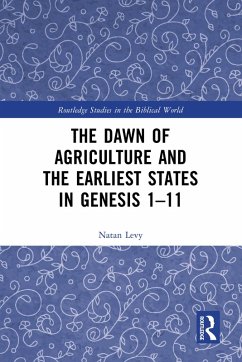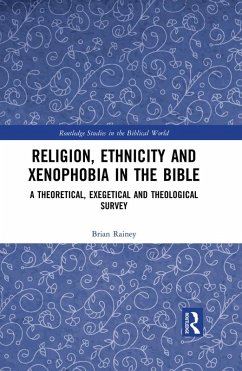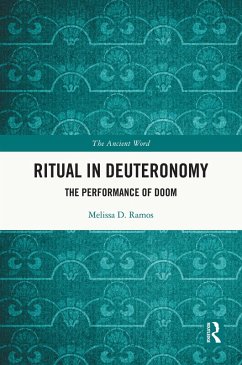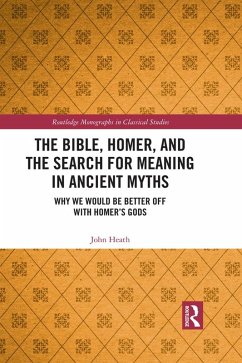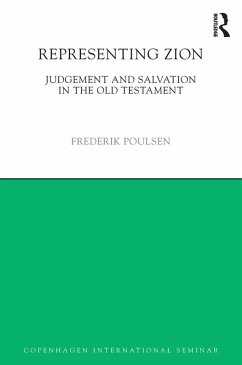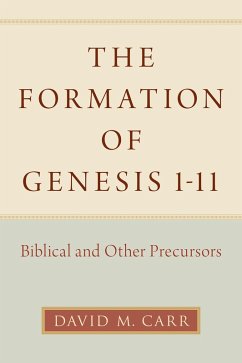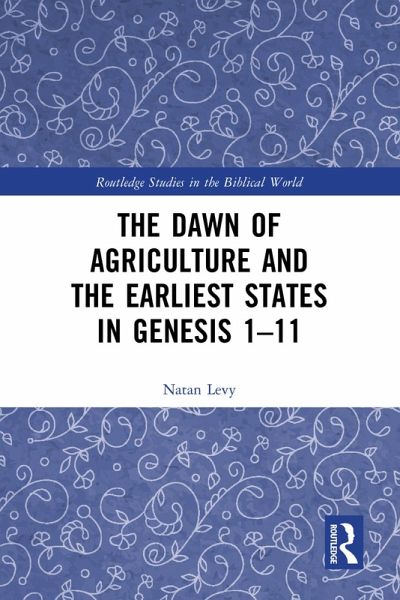
The Dawn of Agriculture and the Earliest States in Genesis 1-11 (eBook, PDF)
Versandkostenfrei!
Sofort per Download lieferbar
39,95 €
inkl. MwSt.
Weitere Ausgaben:

PAYBACK Punkte
20 °P sammeln!
This book invites a close textual encounter with the first 11 chapters of Genesis as an intimate drama of marginalised peoples wrestling with the rise of the world's first grain states in the Mesopotamian alluvium.The initial 11 chapters of Genesis are often considered discordant and fragmentary, despite being a story of beginnings within the context of the Bible. Readers discover how these formative chapters cohere as a cross-generational account of peoples grappling with the hegemonic spread of domesticated grain production and the concomitant rise of the pristine states of Mesopotamia. The ...
This book invites a close textual encounter with the first 11 chapters of Genesis as an intimate drama of marginalised peoples wrestling with the rise of the world's first grain states in the Mesopotamian alluvium.
The initial 11 chapters of Genesis are often considered discordant and fragmentary, despite being a story of beginnings within the context of the Bible. Readers discover how these formative chapters cohere as a cross-generational account of peoples grappling with the hegemonic spread of domesticated grain production and the concomitant rise of the pristine states of Mesopotamia. The book reveals how key episodes from the Genesis narrative reflect major societal revolutions of the Neolithic period in Mesopotamia through a three-fold hermeneutical method: literary analysis of the Bible and contemporary cuneiform texts; modern scholarship from archaeological, anthropological, ecological, and historical sources; and relevant exegesis from the Second Temple and rabbinical era. These three strands entwine to recount a generally sequential story of the earliest archaic states as narrated by non-elites at the margins of these emerging state spaces.
The Dawn of Agriculture and the Earliest States in Genesis 1-11 provides a fascinating reading of the first 11 chapters of Genesis, appealing to students and scholars of the Hebrew Bible and the Near East, as well as those working on ecological injustice from a religious vantage point.
The initial 11 chapters of Genesis are often considered discordant and fragmentary, despite being a story of beginnings within the context of the Bible. Readers discover how these formative chapters cohere as a cross-generational account of peoples grappling with the hegemonic spread of domesticated grain production and the concomitant rise of the pristine states of Mesopotamia. The book reveals how key episodes from the Genesis narrative reflect major societal revolutions of the Neolithic period in Mesopotamia through a three-fold hermeneutical method: literary analysis of the Bible and contemporary cuneiform texts; modern scholarship from archaeological, anthropological, ecological, and historical sources; and relevant exegesis from the Second Temple and rabbinical era. These three strands entwine to recount a generally sequential story of the earliest archaic states as narrated by non-elites at the margins of these emerging state spaces.
The Dawn of Agriculture and the Earliest States in Genesis 1-11 provides a fascinating reading of the first 11 chapters of Genesis, appealing to students and scholars of the Hebrew Bible and the Near East, as well as those working on ecological injustice from a religious vantage point.
Dieser Download kann aus rechtlichen Gründen nur mit Rechnungsadresse in A, B, BG, CY, CZ, D, DK, EW, E, FIN, F, GR, HR, H, IRL, I, LT, L, LR, M, NL, PL, P, R, S, SLO, SK ausgeliefert werden.




